Text
Bocchi the Rock! Ep.1 | Swapping Parts of Her Lunch with the Teacher
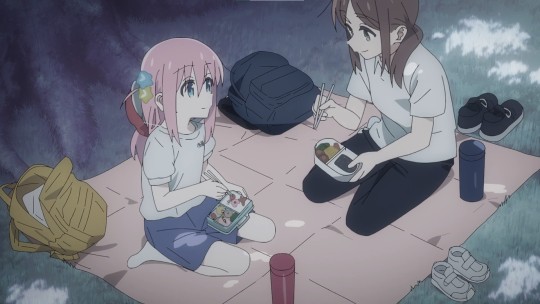

Bocchi:
The girl who ends up all alone at a picnic, swapping parts of her lunch with the teacher.
Bocchi the Rock! Ep.1 | 0:17
This scene is one of the moments in the beginning of Ep. 1 that explains how lonely she was during her childhood before she started learning the guitar.
In Japanese elementary and junior high schools, lunch is usually provided as a school meal, so when it comes to events like this, it is customary for parents to go through the trouble of making special bento boxes.
When it's time for lunch at an event like this, it's customary to sit in a free area within a designated space and have lunch with a small group of close friends, so it's a popular way to enjoy sharing the special lunch with friends, showing each other the contents and exchanging a few bites.
(Due to the Covid-19 pandemic, it may not be necessarily common in recent years to have lunch like this in a picnic, but it has been a longstanding common practice.)
During such fun-filled lunchtime, eating alone with a teacher, without being able to join any group of classmates, is a symbolic representation that strongly conveys the fact of being a friendless child.
Of course, teachers may follow up by talking to the children to ensure that they are not left out of such a group, but children who finally fail to join any groups will eat lunch with their teachers in this way.
A child who has to eat with a teacher like this suffers an intense sense of inferiority because he/she is the only one who cannot join the group while all the other children have friends to eat with, and this is noticeable to the children around them, so that lunch time turns into a painful time of being humiliatingly exposed.
At first glance, this may just seem like a scene where she happens to be having lunch with a teacher because she has few friends, but from a Japanese perspective, it is a brief and powerful scene that shows that she had no friends at all and had experienced this painful loneliness that comes with it.
If you were Japanese and said to a Japanese person, "When I was a child, I had lunch at school picnics with only my teacher," that is symbolic enough to tell that you did not have any close friends at that time.

Bocchi:
(The online world is where I belong.
Sorta makes me not wanna go back to school…)
Ep.1 | 9:01~
This is a scene in a park on the way back from school, where Bocchi tried to gather bandmates by dressing up in a “band girl�� style (see my previous post for details) and failed.
This line is, to be precise, monologuing as below:
Only the online world is where I belong.
I don't wanna go to school anymore…
She had always felt difficulty in her social skills since she was young, and as a hope to change herself and her world, she diligently practiced guitar for long hours every day for three years.
It must have taken a lot of courage to reveal herself in a way like a last resort that undoubtedly exposed her as a "band girl".
However, she was confronted with no one being interested in her, which must have caused a considerable sense of despair.
As this anime is fundamentally comical, this line in this scene does not strongly emphasize a tragic feeling, but it was a moment that truly conveyed the emptiness realized by a lonely young girl in reality.

It is not always appropriate to think of the “what if” of a story easily, but if she had not met Nijika here, I think it would not have been surprising if Bocchi had become a shut-in from the next day onwards.
29 notes
·
View notes
Text
Bocchi the Rock! Ep.1 | I'm Already a Total Rocker Chick!


Bocchi:
I look… I look so cool!
I'm already a total rocker chick!
I look like a real somebody!
The people can't look away!
Bocchi the Rock! Ep.1 | 6:59~
The term "rocker chick" is used here, but in Japanese it is expressed as バンド女子(band girl).
This is a colloquial term that refers to underage girls, such as high school girls, who are into bands.
It refers to teenage girls who are enthusiastic about band activities as players or are passionate about going to rock band live concerts as audience members.
In Japan, a typical band girl is stereotypically known for collecting large quantities of band merchandise, such as badges, wristbands, stickers, T-shirts, and towels, and often wears them or uses them to decorate her bag.
Here she, who longed to become a band girl, was complimenting herself because she was quite like one of them.


Bocchi:
(Nijika-chan's fashionable, too.
She's got the real rocker-chick vibe.
Meanwhile, I'm in a potato-quality tracksuit
with a real bear of a set of bags under my eyes, and a back as arched as a cat…)
Bocchi the Rock! Ep.1 | 10:31~
"Rocker-chick" here is also referred to as バンド女子(band girls).
Nijika wasn't wearing any band merchandise or anything, but because she confidently dressed fashionably and blended in well with the city of Shimokitazawa, Bocchi feels like she has an active, band-girl-like mentality.
(Shimokitazawa is known as a town of subculture, with many trendy shops for vintage clothing, music, dining, and more. It's a cutting-edge town of youth culture, but it can be a little intimidating for minors to visit because there are many young adults and college students around.)
"Potato-quality tracksuit" is a slang term for lame trucksuits in Japanese, actually said as 芋ジャージ(potato tracksuit).
(ジャージ is the Japanese pronunciation of the word "jersey", but in Japan it is used to refer to a tracksuit.)
It specifically refers to tracksuits in red or purple hues, similar to sweet potatoes, but the term can be used to emphasize the tackiness of any color.
"With a real bear of a set of bags under my eyes," is actually being said "really bad under-eye circles".
In Japanese, the pronunciation for "under-eye circles (eye bags)" and "bear" are both クマ[kuma], so there is an association with the image of a bear.
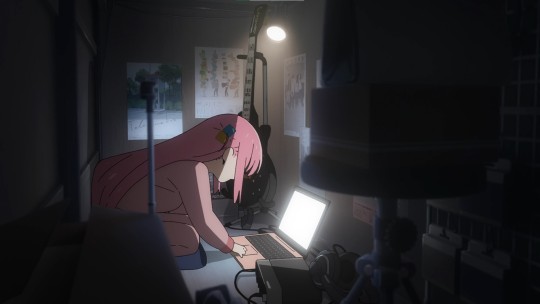
The posters and such that appear in the anime seem to be parodies of real-life rock bands and the like.
While I'm not very familiar with my country's rock bands, there are some that even the average Japanese person would recognize, such as those listed below.

In Anime:
In Real:
かいもの ねだり / HAKO-BOON
ないもの ねだり / KANA-BOON
Notes
かいもの: Shopping
ないもの: Something that doesn't exist
ねだり: Begging
かいもの ねだり: Begging to go shopping
ないもの ねだり: Begging for something that doesn't exist

In Anime:
In Real:
SUPER FEEVER
SUPER BEAVER
スリープ パイプ (Sleep Pipe)
クリープ ハイプ (CreepHyp)
The Siro-Magnons
THE CRO-MAGNONS
There seem to be quite a few people creating detailed videos summarizing the references in this area, so it might be interesting to search for them.
13 notes
·
View notes
Text
Bocchi the Rock! ep 6 | Happiness Spiral!


Kikuri: Drinking lets me forget everything, so I just…
Bocchi: Everything?
Kikuri:
You know, like fears about the future – Pension problems! Rural depopulation! The poverty gap!
I call it a Happiness Spiral! Kids, try this at home!
Bocchi: (What a sad kind of happiness…)
Bocchi the Rock! ep 6 | 11:15~
The next unique images displayed in this "happiness spiral" scene are parodies of two relatively well-known Japanese memes.
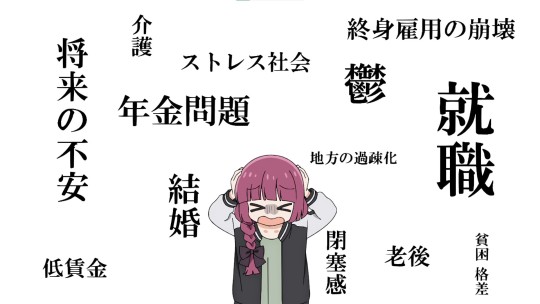
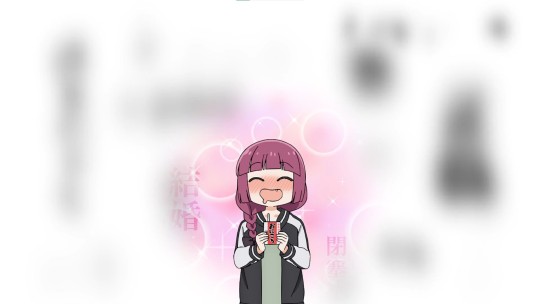

The source of the former image is the following.

The written Japanese words are almost identical.
The only keywords in the original image are 政治不信 (political distrust) and 脂肪肝 (fatty liver), both of which were probably seen as dark humor and avoided just in case of being considered unnecessarily extreme.
The drink in the original image is called Strong Zero, a popular Japanese mass-market alcoholic beverage that contains 500mL of 9% ABV and costs about 1.5 US dollars.
While it is a fairly strong alcoholic beverage, but very cheap, it has occasionally been used as a joke on the Internet about a drink commonly consumed by low-income people with social and economic insecurities who rely on alcohol to distract themselves from their insecurities.
The appearance of this image elicited much laughter and sympathy due to its dark humor, and it exploded and became famous in certain circles on the Internet as a kind of Japanese meme.
The original source of the later image is the following one, which was published in a newsletter by some Japanese municipality, explaining the vicious cycle of drug addiction.
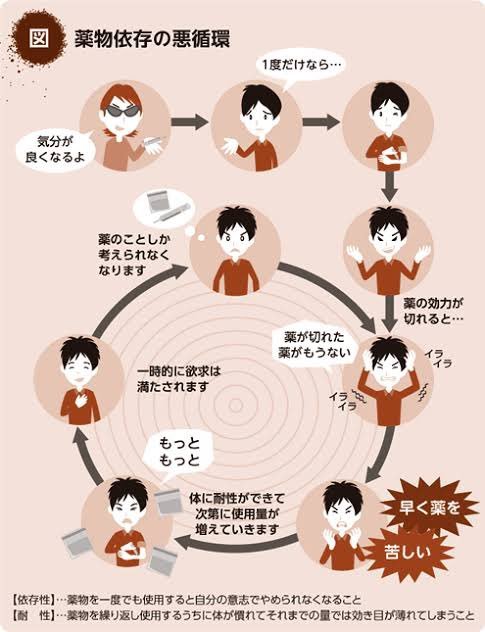
(The following article summarizes the details well.)
https://www.kotaku.com.au/2014/01/in-japan-the-cycle-of-dependency-has-gone-viral/
Starting with this image, it became a Japanese meme indicating a vicious cycle of dependence on various hobbies and personal tastes, which proliferated while being altered.
These scenes are drawn in a single frame in the original comic, which does not show these parodies, so they are original to the anime.
These two memes come from different sources and were popular at different times, but both memes are straightforward examples of addiction, and I think this is a good move by the animators.

Kikuri: I'm gonna put some skin in the game.

The direct translation of what she said here is "I'll take off one of my clothes and show you some skin," but it is actually an idiom for helping someone with such things as good will.
So Bocchi was perplexed when Kikuri actually started to take off her jacket, since it is not usually used in the sense of taking off one's jacket.
The translator probably tried to use the same skin-related expressions.
In Japanese, the expression conveys that she is very grateful to Bocchi.
23 notes
·
View notes
Text
Bocchi the Rock! ep.6 | Miso Soup With Clams
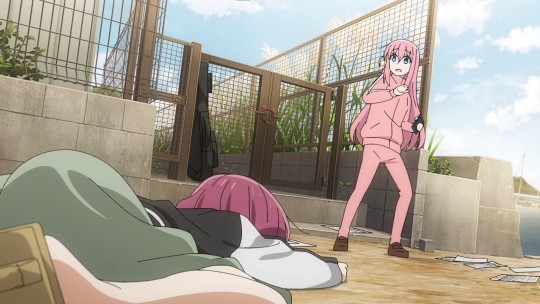
Kikuri: W-Water… Please…
Bocchi: R-Right! I'll go buy some—
Kikuri: A-And hangover medicine.
Bocchi: R-Right!
Kikuri:
And miso soup with clams…
And rice porridge too…
Preferably in a bed dressed with freshly line-dried sheets…
Bocchi: Sh-She's very demanding...
Bocchi the Rock! ep 6 | 4:42~
This is the scene at the beginning of episode 6 when drunken Kikuri asks for cares.
There are several regular ingredients for miso soup, and clams are one of them.
Ornithine, which is particularly abundant in freshwater clams (called しじみ[Shijimi] in Japanese), is thought to help liver function and relieve hangovers, and miso soup itself is a stomach-friendly soup, so miso soup with clams is a staple hangover remedy for Japanese people.
(Rice porridge is also one of the most standard meals for a hangover, as it is easy on the stomach.)
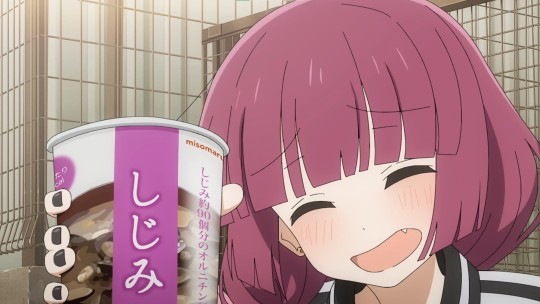
Most Japanese convenience stores offer free hot water from the provided electric kettles, so after buying miso soup, instant noodles, etc., it is possible to add hot water and eat it right away.
Bocchi also bought miso soup with clams at a convenience store and brought it to Kikuri with hot water.
Although there was no scene to describe, it must have been a courageous task for shy Bocchi to pour hot water into the miso soup in the store, as it is a bit conspicuous. Her nice kindness.

Also, as Kikuri requested, anti-hangover drinks can be purchased at convenience stores and are good friends for drinkers.

Bocchi: Actually, I need an ambulance!
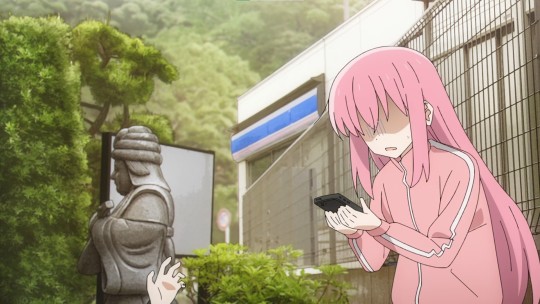
Bocchi: H-Hello?
"This is the news for 4:30 pm…"
The scene shortly before Kikuri asked for help.
In Japan, the number to call an ambulance is 119, while the telephone Time-of-Day service is 117, so she is thought to have mistakenly called 117.
The subtitle describes "the news for 4:30 p.m.", but in actual Japanese, the machine voice simply tells that it is 4:30 p.m.
21 notes
·
View notes
Text
Bocchi the Rock! ep 5 | Farewell to Yukichi

Lend me your ears.
My new song, "A Farewell to Yukichi."
Bocchi the Rock! ep 5 | 0:41~
This is the first scene in episode 5 where she was excited to be paid for her part-time job.
Shocked to hear that she needed to be collected for a live concert, she burst into a song of her sorrow, whose title was "Farewell to Yukichi."
Yukichi refers to 福沢 諭吉(Fukuzawa Yukichi), the man whose name appears on the Japanese 10,000-yen bill. It is also often used as a slang synonym for the 10,000-yen bill.
Here she had to part with 10,000 yen, so she sang farewell to Yukichi.
Incidentally, Japan plans to issue a new banknote in 2024, and it has been decided that the person on the 10,000-yen bill will be changed to a different person. However, since he has been the symbol for 40 years, Yukichi will remain the accepted slang for 10,000 yen for a while.
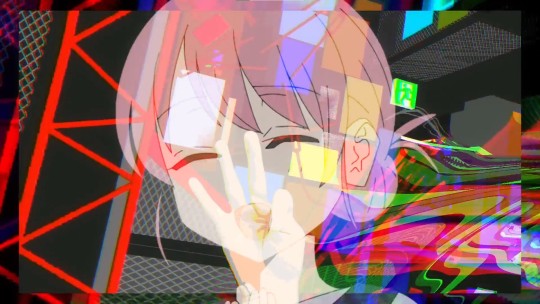
Bocchi (Mother…)
Michiyo: I'll cook some red rice!
Bocchi the Rock! ep 5 | 21:37~
This is an imaginary line from Bocchi's mother (Michiyo) at the end of episode 5, when Bocchi is thinking about assigning her family to the five-ticket quota.
"Red rice", called お赤飯[osekihan] in Japanese, is a traditional Japanese rice dish consisting of glutinous rice mixed with red beans called adzuki.
As the name implies, the red bean broth soaks into the rice, giving it an overall red appearance.
Although it depends on the person, most Japanese people do not eat it in their daily lives. This is a special dish made and eaten on celebratory occasions and events.
Therefore, the phrase "to cook some red rice" is an idiom that implies the meaning of celebration by cooking it.
(It is a historical tradition, so not all Japanese necessarily cook red rice, but the expression "making red rice" is firmly rooted in the Japanese language to indicate celebration.)
So here, Bocchi imagined that if she invited her mother, she would be so happy that would cook some red rice to celebrate with her.


Convenience stores in Japan often sell sekihan onigiri (rice balls made of red rice), but personally, I am always reluctant to eat them on an uneventful day because they are a meal for celebration. People who simply like red rice as a dish would buy and eat it without concern.
16 notes
·
View notes
Text
Bocchi the Rock! ep 3 | What'll she roll?

Nijika: There! What'll she roll? What'll she roll?
Ryo: Dun-dun-dun-dun-dun…
Nijika: Talk about school! TAS for short!
Ryo: Proceed.
Bocchi (Eeeeeh....)
Bocchi the Rock! ep 3 | 3:31~
This scene is a parody of a once long-running Japanese talk show program, ライオンのごきげんよう(Gokigenyou by Lion)
("Gokigenyou" is a very classical greeting, and is not usually used. It is a symbolic phrase used to greet each other at a school for wealthy daughters.
But about this program, its content and cast have no relation with wealthy daughters, and it is assumed that Lion, the sponsor of the program and their catchphrase includes greetings, used it for the program's name as it is an unique greeting.)
This program, aired for 25 years until 2016, used a dice roll to pick the guest's talk theme like this, which was characterized by throwing the dice after saying, 何がでる?[nani ga deru?](What'll be rolled?) twice along with its unique music.
Ryo's saying "dun-dun" is an imitation of the music. (This is a parody, so it doesn't resemble it at all…)
Another peculiarity was that after the theme was decided, the host announced a forced shortening of the theme and then had the audience recite it back.
This is why Nijika shortens "Talk About School" to "TAS" here, and the reason why Ryo says "Proceed" is to get Bocchi to recite it back as in the program.
This program has been quite famous, so if you were in a situation where you were rolling dice with Japanese people, and then said "Nani ga deru kana?" twice in the same good mood as like Nijika, probably the majority of Japanese would respond like "Gokigenyo, right? " or "Oh, how did you know that?"
(kana? is a word that softens the impression of a question.)
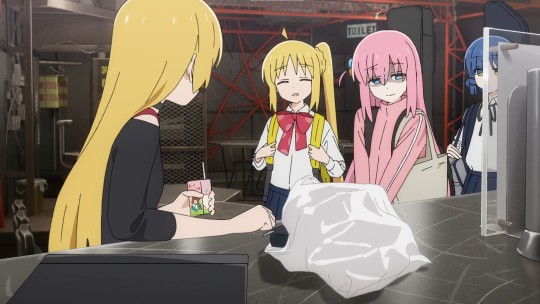

The manager(Nijika's sister)'s meal here seems to be apple juices for infants and rice balls with おかか[okaka].
おかか[okaka] is one of the words for dried bonito flakes.
Generally, dried bonito flakes are described as 鰹節[katsuo bushi], but when it is used as a sole flavor of something (mostly rice balls), it is often described as おかか[okaka].
18 notes
·
View notes
Text
Bocchi the Rock! ep 10 | Grave Cafe

Hitori:
(Maybe if it was a grave cafe…)
A-Afterlife for two… Souvenirs from the grave available…
Placard:
"Grave Cafe: This way to the afterlife"
Bocchi the Rock! ep 10 | 1:05~
This scene represents her escape from reality when it was decided that she had to wear a maid cofe's uniform at the school festival.
The reason for the strange expression "grave cafe" here is that both the word "maid" and the word 冥途, meaning afterlife, have the same pronunciation in Japanese, [meido].
The exact meaning of the placard is "Afterlife Cafe," as it is labeled 冥途喫茶, but the translator probably thought that was confusing and used the term "Grave Cafe".
Being aware of her own gloomy personality, she associated the word "maid" with 冥途[meido](Afterlife) and imagined a non-existent place like a Grave Café, thinking it would still be better to work there.
The white clothing she wears in this scene is one of the traditional Japanese burial outfits, a symbol often used to represent Japanese ghosts.
"Souvenirs from the grave" is actually expressed in Japanese as 冥途の土産[meido no miyage](Souvenirs to the afterlife), a Japanese idiom meaning like a something good experience when dying.
Here she is not saying it in the original meaning, but as a joke because of the association of the word meido.

She is so adorable and her strange behavior has often been expressed jokingly, but as a matter of fact she would have had such a subconscious, almost traumatic fear of interpersonal relationships - so much so that she soaked herself in an ice bath to take the day off work and fled to the back door to avoid interacting with people as a maid.
Her last word for this season was very simple, but I think it was a modest one that represented a great deal of growth for her.
14 notes
·
View notes
Text
Bocchi the Rock! ep 04 | Are ya winning, diners?

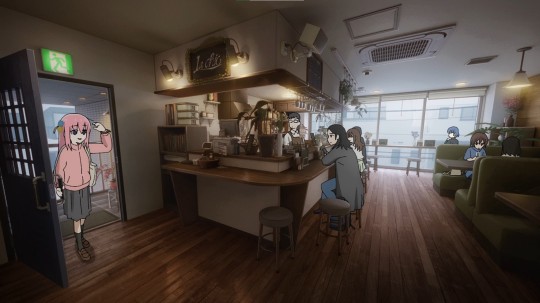
Are ya winning, diners?
Bocchi the Rock! ep 04 | 16:40~
The actual expression here in Japanese means like "Hey owner, are you open now?".
In Japanese she is pronounced as follows:
"へい 大将 やってる?"[Hei Taishō Yatteru?]
These are put together to form an old Japanese set phrase used when a familiar customer coming unexpectedly asks the owner of an izakaya or sushi restaurant if it is open at the moment in a friendly manner.
Such restaurants had Japanese-style noren(short split curtain) hanging at their entrances, so it is the same old action to say it when ducking under the noren, flipping it over with a hand, just as she did.
This is generally taken that the speaker is a local resident and has a longstanding relationship with the owner.
Today, people very rarely use this phrase in its original meaning, not as a joke, and it is often used only in old movies and TV dramas, so when it is actually used, it will give the impression of acting something out, even if by Japanese.
This is a phrase used when entering a restaurant like the above, and odd to use when entering a coffee shop, but for her, this would have been the only phrase she could think of. For Japanese people, the scene is a bit comical.
The direct translation is confusing as above, so the translator probably used "Are ya winning, son?" and modified it, because it also is used when entering a room but is a bit wrong and interesting to use in this situation.
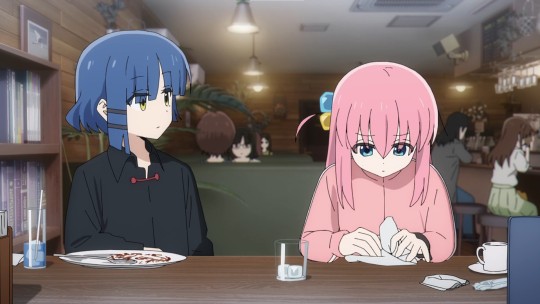
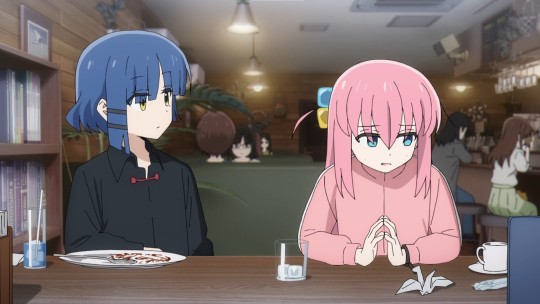
Like Bocchi and a certain number of Japanese people, I tend to fold a crane with a napkin when I feel awkward or can't think of a topic.
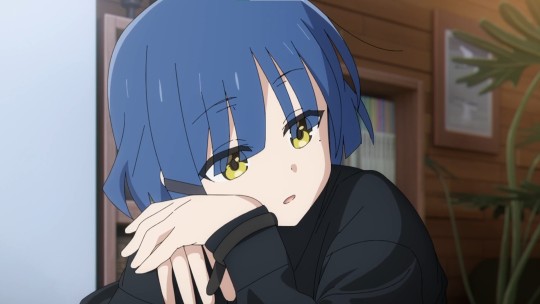
Ryo:
Bringing a wide variety of individuals together into one sound…
That's the color that Kessoku Band will have.
This line looks related to the lyrics of "If I could be a constellation" in the last episode.
It may had stayed in Bocchi's mind ever since.
84 notes
·
View notes
Text
Bocchi the Rock! ep 11 | Kitarwin's Theory!
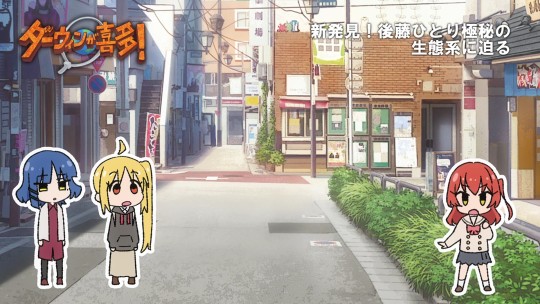
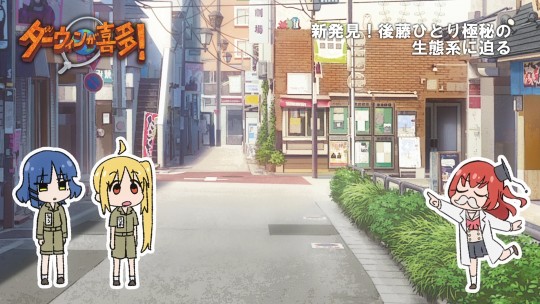
Kita: Gotoh-san would never be in a place frequently visited by others.
(Kitarwin's Theory!)
Nijika: So where should we look?
Bocchi the Rock! ep 11 | 1:30~
The upper right text means "New discovery! Closing in on the top-secret ecosystem of Hitori Goto".
This scene is a parody of "Darwin's Amazing Animals", a Japanese national TV documentary that is well known (at least in Japan).
In Japanese, this title is named as "ダーウィン が 来た" [Darwin ga Kita] (Darwin came) and the word 来た[Kita](came) is pronounced the same as her name.
Therefore, 喜多[kita], the kanji of her name, is shown here instead of 来た(came), as a joke.
In a subtitle for overseas, the words Darwin and Kita are well combined and described as Kitarwin's Theory!
Skillful job by the translator.
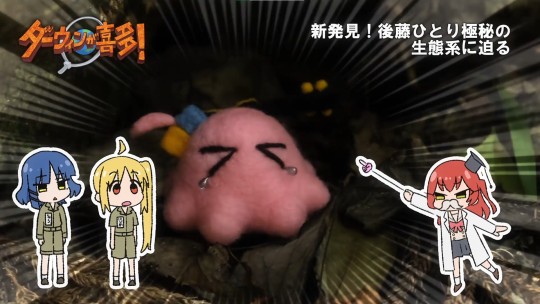
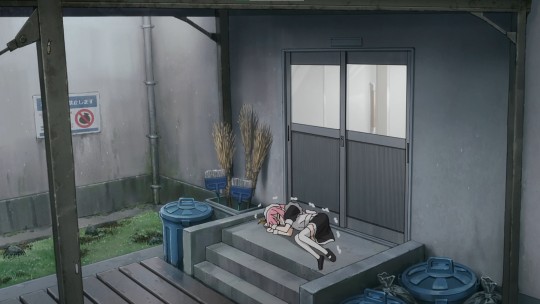
Typical backdoor found commonly in Japanese high schools, which tends to be clammy as Kita said.
Here may be a roofed passage leading to swimming pool, as it looks like lined with duckboards.
39 notes
·
View notes
Text
Isekai Ojisan ep 12 | Basue
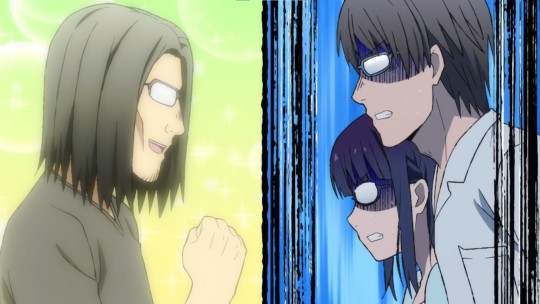
Basue's the latest arcade's UFO catcher!
Isekai Ojisan ep 12 | 8:57~
In this scene the characters are actually saying the following:
Ojisan:
The latest arcade's UFO catcher!
Takafumi & Fujimiya:
Basue's arcade's UFO catcher!
Basue(場末) is a Japanese word that indicates locating a building or other structure in the suburbs or on an alleyway.
Because of its location, it gives the feeling that it is not very trendy or that it is old and rundown.
It is a word that gives a unique impression such as running a small Izakaya(Japanese bar) for many years, mainly in the suburbs, for familiar customers.
The song sung by Mabel was used in the old UFO catchers made by SEGA. For today's youth, the song is rarely heard except in game arcades set up in suburban shopping malls or Ryokan(Japanese inns).
Therefore, in the previous line, Takafumi and Fujimiya said the following, recalling an old memory.
Fujimiya: Shopping mall!!
Takafumi: Vacation trip?
Then they find out it is an old UFO Catcher and they describe it as one that would be found in a Basue arcade, but for Ojisan, who only has memories of that time, it is the latest one.
Hence the discrepancy in the lines shown at the beginning of the above.
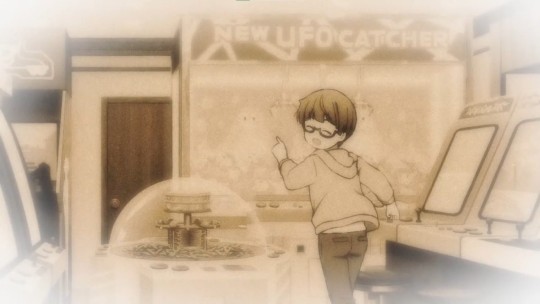
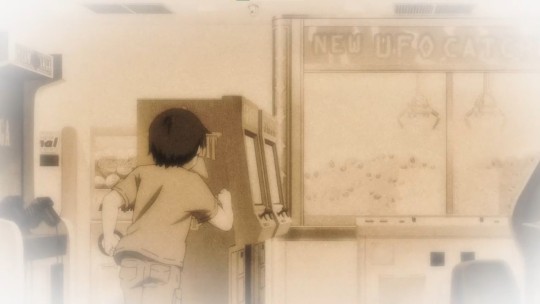
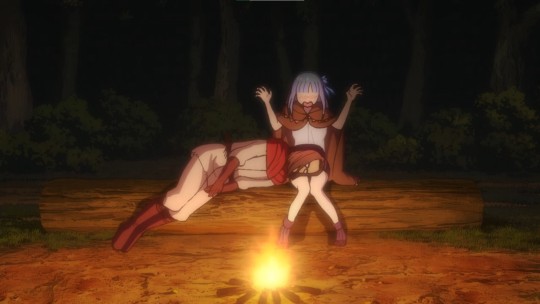
This is a comical scene, including the nightmarish Ojisan smile that follows, but in fact, if I were 20 years old, transported to another world where I was constantly sharpening my nerves, and suddenly heard the music I loved as a child, I would not be surprised if I burst into tears.
0 notes
Text
Bocchi the Rock! ep 8 | Rain charm (teru teru bōzu)
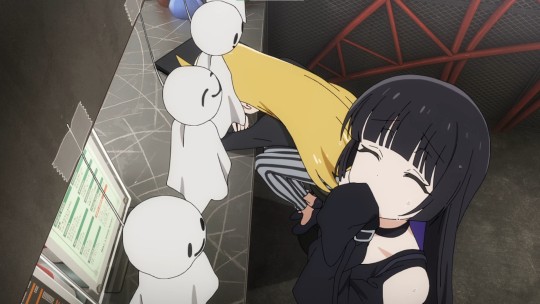

The many white dolls hanging above are the rain charms (teru teru bōzus) that Bocchi proposed to make at the end of the previous episode.
It is a superstitious custom to wish for good weather in Japan, and is basically made by adults together with little children who are looking forward to the event, to ease their worries for bad weather.
It is unusual for high school students like the Bocchis or older adults to make them.
If they do make it, it would be most likely either as a modest activity to enjoy the bad possibilities, or because they wish it so seriously that they are willing to put their faith in superstition.
And for Bocchi, she hoped to have a good concert so much that she was willing to propose it voluntarily, even if she was worried that maybe everyone might see her as a childish.
Basically, it is believed that just one hanging alone brings benefits, and in many cases, even if you make more than one, each person only needs to make their own.
Preparing such a large number of rain charms may be a sign of the girls' anxiety about the concert, or it may be a sign that they enjoyed making these rain charms despite their anxiety, but either way, this would be one symbol of the seriousness of the girls' commitment to this concert.
And this would also a sign of deep tenderness of the manager here (Nijika's sister), who faced their feelings and was not dislike hanging these in her work space.

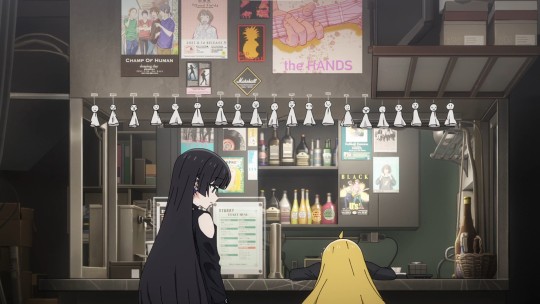
20 rain charms were hung above the counter, matching the total number of tickets they sold, 20, so this may be a sign of the seriousness with which these girls hoped their entire audience would come to the concert safely.

In general, the rain charms are hung by the windows; but since STARRY is located in the basement, it seems that they were also hung at the front door instead.
These 4 rain charms may be for the 4 girls in the Kessoku band themselves.
13 notes
·
View notes
Text
Bocchi the Rock! ep 6 | Five Onikoros

Kikuri :
A concert costing over five Onikoros…
It'd better be worth it!
Bocchi the Rock! ep 6 | 20:23~
Kikuri mentions Onikoro, which refers to Japanese sake in paper cartons.
It would not be difficult to understand, as she is shown drinking Onikoro many times before leading up to this scene.
In reality, it is called Onikoroshi(鬼ころし).
Onikoroshi is the name of the real product, not the type of liquor, so it looks called Onikoro to avoid trademark infringement.
Most sake is bottled, and sake that comes in paper cartons and is drunk through a straw is relatively rare. This means that it is rare for sake to be sold in paper cartons among the vast variety of sake available. However, because of its low cost and ready distribution, sake itself in paper cartons is readily available at most convenience stores in Japan.
Of the multiple varieties of paper-packaged sake, Onikoroshi is one of the most famous, as its name means "Killing(koroshi) demons (Oni)" and is also memorable to the Japanese.
(The name comes from that it is so strong and dry that it can make even the strongest of demons crumble into drunkenness.)
If you mention the topic of Onikoroshi to Japanese people, there are probably a certain number of people who will respond, "Oh, that sake in the paper carton."
The price of the ticket Kikuri bought was about the equivalent of five Onikoros, so she, a lover of liquor, expresses her high expectations in a teasing way.

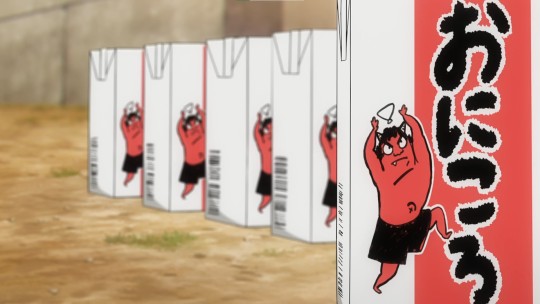
The package is also firmly labeled Onikoro(おにころ).
23 notes
·
View notes
Text
About Here
I usually leave comments on YouTube about the unique Japanese culture and sensitivity depicted in anime.
(This is a part of my English learning journey!)
In this space, I post copies of past comments that have been blocked, additional information, and comments that were wrongly marked as spam.
(Since my comments tend to be lengthy, they sometimes get flagged as spam…)
✿If you notice any incorrect English expressions, please let me know via the Message link.✿
✦I'm also open to suggestions on topics you would like me to cover・ᴗ・✧
0 notes